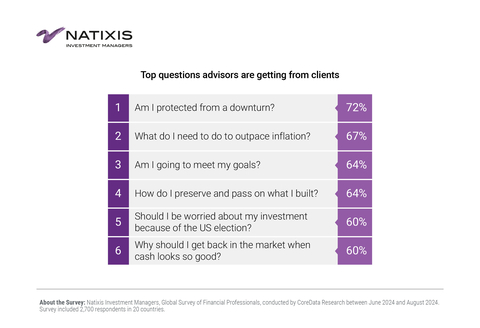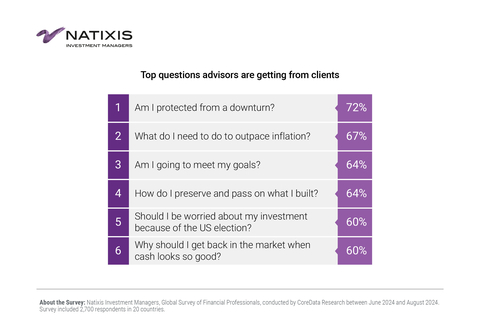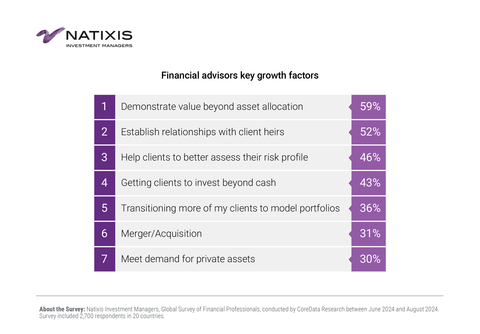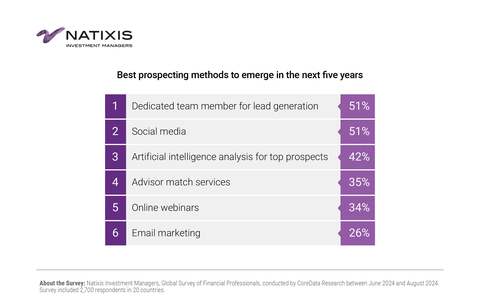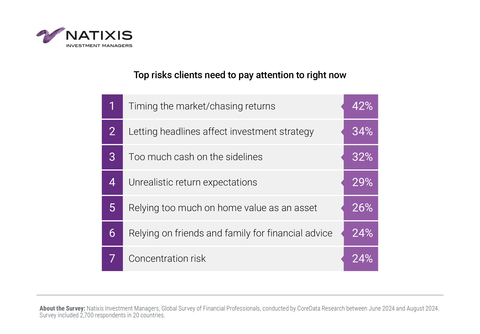BOSTON--(BUSINESS WIRE)--Financial advisors are navigating short-term economic risks and long-term demographic challenges as they look to add assets and clients to ensure the longevity of their businesses, according to findings from Natixis Investment Managers (IM) 2024 Survey of Financial Professionals, published today.
Natixis IM surveyed 300 U.S. financial advisors as part of a larger global survey of 2,700 financial professionals across 20 countries. The U.S. findings presented here provide insights into advisor’s growth strategies, their challenges, and how to adapt their business to market fluctuations.
Over the next three years, financial advisors are targeting an average AUM growth rate of 11% growth and an average of 16 new clients per year, compared to a target of 34 new clients a year globally. While it is evident that advisors have mastered the art of recalibration – navigating through market turbulence, record-high inflation, and a historic interest rate hike cycle – they are now faced with adapting their strategies to navigate both short-term economic risks and long-term business risks.
The survey found the biggest long-term pressures advisors face include:
- Generational wealth transfer: The Great Wealth Transfer, in which $84 trillion1 will pass from one generation to the next over the next 20 years, is one of the greatest concerns among advisors. Forty-one percent of U.S. advisors say it represents an existential threat to their business. Further, 30% are worried they will not retain assets from clients’ spouses or next-generation heirs.
- The economic impact of the U.S. election and public debt: While 88% of advisors hear concerns from clients about the U.S. election impacting their investments, 85% see underlying economic fundamentals as more important than election results. Ultimately, policy will matter long-term as 68% of advisors report public debt as the top economic risk.
- Growing demand for financial planning services: Advisors currently spend 46% of their time meeting with or managing clients, namely, keeping them invested and helping them to avoid timing the market. In the long run, they’ll need to address a growing demand for financial planning services, which 62% of US advisors believe differentiates their practice.
“Advisors have had to demonstrate their flexibility and ability to navigate historically challenging market dynamics in recent years. Now, they need to flex their strategies even more to appeal to the next generation of investors,” said David Goodsell, Executive Director of the Natixis Center for Investor Insight. “Finding more time to deepen relationships with clients and financial planning service offerings will be crucial to the success of advisors and their businesses in the long run.”
Retaining vs. Prospecting: The Race to Thrive Amid the Great Wealth Transfer
In anticipation of the Great Wealth Transfer, financial advisors are relying on building relationships with current clients but realize the need to prospect for new clients as well. U.S. advisors report retaining client relationships 78% of the time when the spouse inherits, but that drops to 58% when their clients’ children inherit. Further, almost a quarter (22%) advisors report that they’ve lost significant assets through generational attrition.
To retain assets, 92% of advisors say relationship-building is the number one course of action that helps. To build relationships with the next generation of clients, 85% say they are regularly discussing family wealth planning with existing clients and 87% extend family wealth planning discussions to family members. Advisors also say offering services such as ancillary services such as trust services (55%), personalized services such as networking services (39%) and unified managed accounts (21%) are ways they can retain assets.
On acquiring assets, advisors realize the need to prospect for new clients but currently dedicate only 8% of time to it. Almost half (46%) of advisors are prioritizing client segmentation as an efficient way to improve their prospecting efforts.
Most (96%) place the highest priority on pre-retirees, or people between the ages of 50 and 60, followed by those between the ages of 60 and 65 who are at or just entering retirement (88%). Close to half (46%) of advisors are also increasingly looking at older accumulators between the ages of 35 and 50, who are in their peak earning years and likely in need of comprehensive financial services to address multiple financial goals such as saving for retirement, funding education, and managing debt.
Given the market environment and generational transfer of wealth underway, advisors may be missing opportunities to reach the oldest and youngest group of potential clients.
- Over half of (56%) of U.S. financial advisors are focused on post-retirees, many of whom are drawing down versus accumulating assets but who still need robust financial planning and advice to protect, use and pass on their assets.
- Only 14% place a high priority on prospecting for clients between the ages of 18 and 35, members of Generations Y and Z, who represent the largest segment of the U.S. population.
To improve their prospecting strategies, about half of advisors are looking towards team-based approaches that includes a member dedicated to prospecting. Similarly, almost half (43%) of advisors are leveraging social media strategies for prospecting and 21% find promise in leveraging future AI-powered prospecting tools.
Leveraging Model Portfolios to Improve Efficiency
As advisors look to rebalance their time to focus more on prospecting, more than half of advisors are reporting that model portfolios enhance their efficiency. In the U.S, 94% of advisors are deploying model portfolios into their practice, with 61% using models built and managed by their firm, 53% using models from a third-party asset manager, and 74% building models themselves.
The survey found:
- 71% of advisors report models make it easier for them to implement rebalancing, tactical shifts, and other portfolio changes across their entire book of business.
- 65% of advisors say models enhance the consistency of their investments.
- 62% of advisors say models free up the time needed to deliver financial planning and other services to clients.
- 48% report that models offer an added layer of due diligence and 43% report that they make compliance easier.
- 43% of advisors say models free up time for prospecting.
“Advisors are turning to model portfolios to drive efficiency and consistency while they focus on longer-term demographic pressures,” said Marina Gross, Head of Natixis Investment Managers Solutions. “Our portfolio consulting practice shows that core moderate-risk model portfolios consistently deliver higher risk-adjusted returns with less volatility than the broad market, enabling advisors to focus more time on long-term goals, than short-term performance.”
The survey found the most effective ways financial advisors are incorporating model portfolios into their practice are by:
- Transitioning assets on a case-by-case basis, depending on each client’s willingness (51%)
- Focusing on new assets from new clients (39%)
- Focusing on retirement account rollovers (30%)
- Leveraging a comprehensive approach to convert the entire client base quickly (28%)
- Taking a phased approach with the goal of converting their book over time (25%)
Fewer advisors have found it particularly effective to reserve their use of model portfolios for clients who represent less revenue potential, including clients with lower balances (22%), retirement drawdown clients (20%), and younger clients (13%).
Natixis Investment Manager’s global report on the findings of its 2024 survey of Financial Advisors can be found here: https://www.im.natixis.com/en-us/insights/investor-sentiment/2024/financial-professionals-report
Methodology
Natixis Investment Managers, Global Survey of Financial Professionals conducted by CoreData Research between June and August 2024. Survey included 2,700 respondents in 20 countries, including 300 in the US.
About the Natixis Center for Investor Insight
The Natixis Center for Investor Insight is a global research initiative focused on the critical issues shaping today’s investment landscape. The Center examines sentiment and behavior, market outlooks and trends, and risk perceptions of institutional investors, financial professionals and individuals around the world. Our goal is to fuel a more substantive discussion of issues with a 360° view of markets and insightful analysis of investment trends.
About Natixis Investment Managers
Natixis Investment Managers’ multi-affiliate approach connects clients to the independent thinking and focused expertise of more than 15 active managers. Ranked among the world’s largest asset managers2 with more than $1.3 trillion assets under management3 (€1.2 trillion), Natixis Investment Managers delivers a diverse range of solutions across asset classes, styles, and vehicles, including innovative environmental, social, and governance (ESG) strategies and products dedicated to advancing sustainable finance. The firm partners with clients in order to understand their unique needs and provide insights and investment solutions tailored to their long-term goals.
Headquartered in Paris and Boston, Natixis Investment Managers is part of the Global Financial Services division of Groupe BPCE, the second-largest banking group in France through the Banque Populaire and Caisse d’Epargne retail networks. Natixis Investment Managers’ affiliated investment management firms include AEW; DNCA Investments;4 Dorval Asset Management; Flexstone Partners; Gateway Investment Advisers; Harris | Oakmark; Investors Mutual Limited; Loomis, Sayles & Company; Mirova; MV Credit; Naxicap Partners; Ossiam; Ostrum Asset Management; Seventure Partners; Thematics Asset Management; Vauban Infrastructure Partners; Vaughan Nelson Investment Management; and WCM Investment Management. Additionally, investment solutions are offered through Natixis Investment Managers Solutions and Natixis Advisors, LLC. Not all offerings are available in all jurisdictions. For additional information, please visit Natixis Investment Managers’ website at im.natixis.com | LinkedIn: linkedin.com/company/natixis-investment-managers.
Natixis Investment Managers’ distribution and service groups include Natixis Distribution, LLC, a limited purpose broker-dealer and the distributor of various U.S. registered investment companies for which advisory services are provided by affiliated firms of Natixis Investment Managers, Natixis Investment Managers S.A. (Luxembourg), Natixis Investment Managers International (France), and their affiliated distribution and service entities in Europe and Asia.
7173986.1.1
_________________________
1 Cerulli Associates: U.S. High-Net-Worth and Ultra-High-Net-Worth Markets 2021. https://www.cerulli.com/press-releases/cerulli-anticipates-84-trillion-in-wealth-transfers-through-2045
2 Survey respondents ranked by Investment & Pensions Europe/Top 500 Asset Managers 2024 ranked Natixis Investment Managers as the 19th largest asset manager in the world based on assets under management as of December 31, 2023.
3 Assets under management (“AUM”) of current affiliated entities measured as of June 30, 2024, are $1,320.8 billion (€1,232.3 billion). AUM, as reported, may include notional assets, assets serviced, gross assets, assets of minority-owned affiliated entities and other types of non-regulatory AUM managed or serviced by firms affiliated with Natixis Investment Managers.
4 A brand of DNCA Finance.

